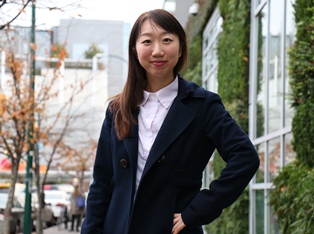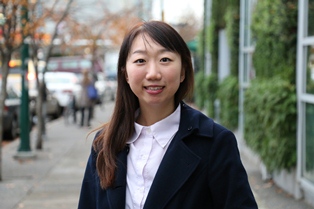Posted on
 Maya Angelou once said that people will forget what you said or did, but they’ll never forget how you made them feel.
Maya Angelou once said that people will forget what you said or did, but they’ll never forget how you made them feel.
For Yeonjoo Kwon and countless others around the world, this quote reflects everyday life as a nurse.
As a registered nurse at Lions Gate Hospital, Yeonjoo is the often the first face patients see when they come out of the surgical recovery room. Many of them are hazy and vulnerable, and counting on nurses like Yeonjoo to make them feel safe, reassured and comfortable.
Providing patients with the best quality care is why Yeonjoo became a nurse. It’s also why she’s excited about the benefits we will get through the Clinical & Systems Transformation (CST) project.
“I believe CST will transform our health care system to a whole new level,” says Yeonjoo. “We are living in the 21st century, and technology has become part of our lives. CST is the answer to the question: Why aren’t we taking full advantage of technology in health care?”
Working in General Surgery, Yeonjoo says seamless, instant access to patient data – including charts, lab results and medical imaging – using the new clinical information system will improve care and efficiency.
She’ll be able to view a patient’s chart before she sees them, which will allow her to make organized plans of care. Yeonjoo adds that CST is all about sharing medical records in one system, helping health care providers to make faster and more informed decisions.
 If a patient is delirious following their operation, infection and sepsis need to be ruled out. Health care providers will look at lab values and test results and monitor vital signs, then report to the physician so they can make clinical decisions and provide orders.
If a patient is delirious following their operation, infection and sepsis need to be ruled out. Health care providers will look at lab values and test results and monitor vital signs, then report to the physician so they can make clinical decisions and provide orders.
Today, physicians can’t access vital signs from a computer and depend on nurses like Yeonjoo to inform them. Through CST, nurses will be able to report vital signs and other assessments in the patient’s electronic chart – which the doctor can view from wherever they are in the hospital.
And since the clinical information system is shared between VCH, PHSA and PHC, patients can be transferred more easily because health care professionals can collaborate in their care.
Yeonjoo says there are other benefits too.
“Based on collected data, if we found out there was a higher incidence of post-op delirium in certain type of surgical patients, we could strive to lower the incidence by eliminating contributing factors.”
Yeonjoo knows change can be scary, but she believes CST will deliver positive benefits that reinforce why she got into nursing in the first place: to make her patients feel like they received the best possible care.
“I really honestly believe that CST will bring about a better future in our health care system.”


